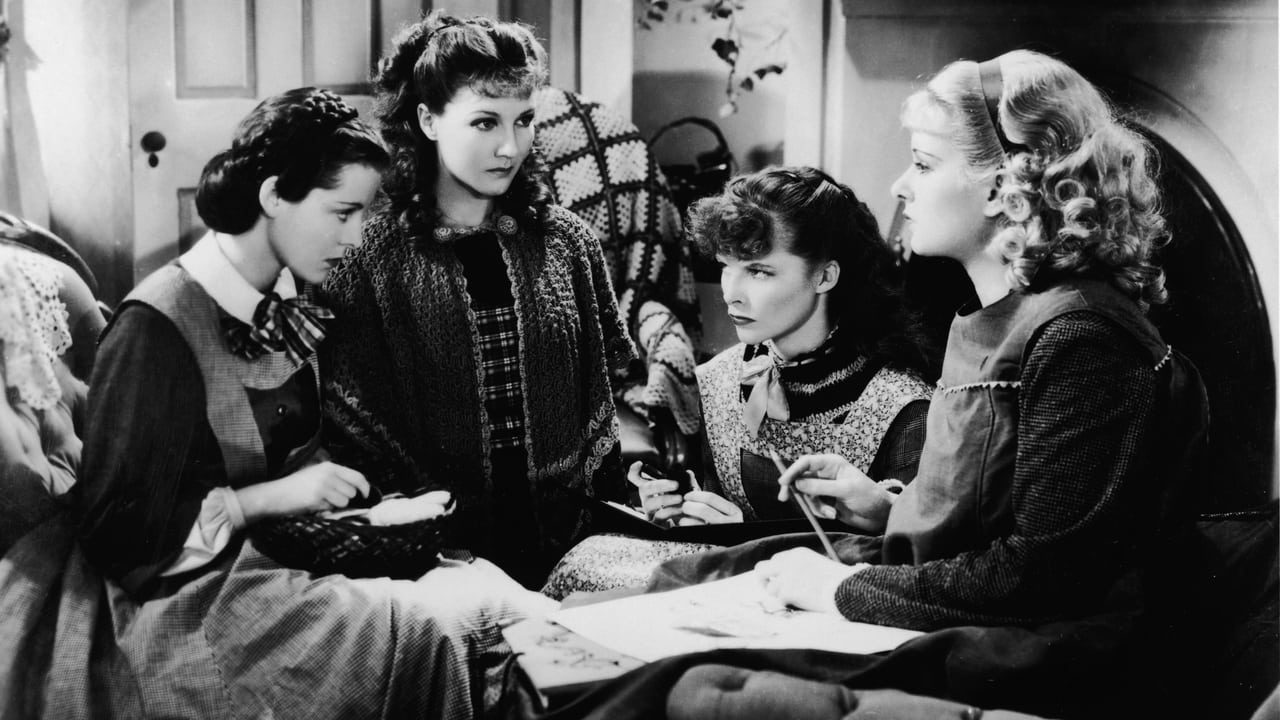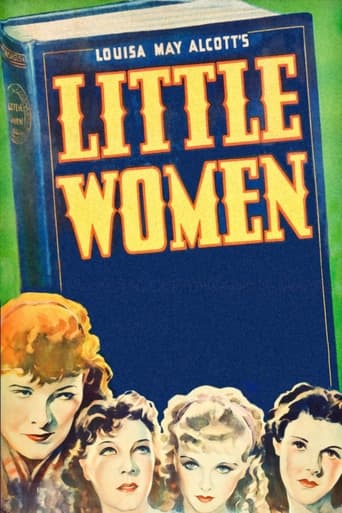



I'll tell you why so serious
Best movie ever!
A different way of telling a story
Your blood may run cold, but you now find yourself pinioned to the story.
View MoreAssociate producer: Kenneth Macgowan. Executive producer: Merian C. Cooper. Initiating producer: David O. Selznick. Copyright 16 November 1933 by RKO Radio Pictures, Inc. New York opening at the Radio City Music Hall, 16 November 1933. U.S. release: November 1933. U.K. release: January 1934. Australian release: 28 March 1934. 12 reels. 115 minutes.SYNOPSIS: Four adolescent girls in Concord, Massachusetts, cope with father's absence and other domestic discomforts during the Civil War.NOTES: Second film version of Alcott's novel. The first was directed by Harley Knoles for Famous Players-Lasky in 1919, starring Lillian Hall, Dorothy Bernard, Florence Flimm and Isabel Lamon. Producer David O. Selznick acquired the rights to this 1933 version in the mid-forties and began shooting a remake starring Jennifer Jones and Shirley Temple. After three weeks of shooting, Selznick decided to abandon the project. MGM then bought the rights for a 1949 remake in which June Allyson played Jo; Elizabeth Taylor, Amy; Janet Leigh, Meg; Margaret O'Brien, Beth; Mary Astor, Mrs. March; and Rossano Brazzi, Professor Bhaer. Peter Lawford was Laurie Laurence, Sir C. Aubrey Smith, his grandfather. Olin Howland repeated his role as the schoolteacher. Mervyn LeRoy directed from a revision of the 1933 screenplay by Sally Benson and Andrew Solt.Nominated for three Academy Awards: Best Picture (won by Cavalcade); Best Director (won by Frank Lloyd for Cavalcade); Best Adapted Screenplay (won!). Number five on the Film Daily's annual poll of U.S. film critics. Number four on the National Board of Review list. Number eight on The New York Times' Ten Best. Outright winner of the Photoplay Gold Medal Award — judged by the movie-going public of America as the Best Film of 1933.COMMENT: An enormous box office and critical success in its day, this remarkably faithful version of Alcott's still-popular novel stands the test of time astonishingly well. Despite Hepburn's somewhat vigorous acting (especially in the early scenes in which the entire cast appears to be shouting at the top of its collective voice), the film excels the 1949 remake in all departments. True, Joan Bennett is more than a trifle over-age for Amy, yet she makes up for this shortfall with her ingratiating performance. (Oddly enough, she seems more charmingly at ease in her earlier scenes than in the later episodes in which she is supposed to be more mature.) Jean Parker is compellingly sympathetic as the doomed and wistful Beth, Douglass Montgomery (a much under-rated actor) is perfectly cast as the charmingly fickle Laurie, while Edna May Oliver walks off with the supporting honors in an equally made-to- measure part as the mean-spirited aunt.That the acting is uniformly so successful can be attributed in large measure to the persuasive skill of director George Cukor. A specialist in eliciting the best from female players, Cukor's control is evident throughout. Even at its most strident, Hepburn's performance is never less than fascinatingly sincere. Character credibility is one of Cukor's hallmarks. Usually you can also add restraint. But if the playing here is somewhat more theatrical than normal, certainly the emotional scenes are handled with typical delicacy.Adding to the style and visual appeal of the direction, the atmospherically gray-toned photography by Henry Gerrard and the notably authentic costumes and sets by Hobe Erwin and Walter Plunkett respectively, capture the essence of period engravings. Also partaking of an important share in the picture's overall impact and faithfulness, Max Steiner's evocative music score is to be especially commended.In short, Little Women has lost so little of its initial charm and delight as to place its splashy Technicolored successor firmly in the shade. Only the most rabid and one-eyed of fans would prefer the Metro reshuffle.
View MoreLittle Women (1933) was directed by George Cukor. The movie is based on the novel written by Louisa May Alcott. The story takes place during the Civil War, but the action is set in Concord, Massachusetts. The film is semi-autobiographical. The book and the film follow the adolescent and young adult lives of the four March sisters: Jo (Katherine Hepburn), Amy (Joan Bennett), Beth (Jean Parker) ad Meg (Frances Dee.) Spring Byington plays their mother, and Paul Lukas plays Professor Bhaer. Jo is the sister who represents Louisa May Alcott. The plot involves her struggle to become a writer, in parallel with Alcott's own struggle to become a successful novelist. George Cukor knew how to bring great performances out of these talented actors. And, of course, his professional relationship with Katherine Hepburn was extraordinary for them both. Little Women was the first of the eight films they made together. Hepburn was only 26 when she starred in Little Women. However, her extraordinary acting ability and her unbelievable beauty were already evident. Her talent was unique, and Cukor knew just how to put that talent onto the screen. If you're a Katherine Hepburn fan--as most of us are--you can't miss Little Women. All films made for the big screen look better on the big screen. However, we saw the movie on DVD, and it worked very well.
View MoreHad I not seen the version of "Little Women" (1994) that starred Susan Sarandon and Winona Ryder, I think I would have liked this version from RKO. However, in comparison the older version is just pretty dreadful. Much of it is because the story is MUCH more subtle and believable in the newer film--and this is odd coming from me because I adore classic Hollywood films and would have expected to prefer the original (as I hate remakes). But, the newer one is believable and sweet--whereas the 1933 version is, at times, just awful. Now I know this might sound like sacrilege, as it was directed by the great George Cukor and starred Katharine Hepburn. But, neither was on top of their game--especially Hepburn. There's little indication in her overly broad performance here that she'd one day be a multiple Academy award winner. Here, she talks VERY fast and seems rather fake. As for the rest of the cast, they are okay--but the film lacks charm and polish. Watchable but do yourself a favor and watch the more recent one--you won't feel sorry.
View MoreThe oft-filmed Alcott novel received its first lavish production in this 1933 version and it's quite good-looking. Hepburn is fine if sometimes overly expressive as the headstrong Jo March and Lukas makes a good impression as Professor Bhaer, but much of the acting is rather stagy and melodramatic. Montgomery makes a very effeminate and wimpy Laurie. Cukor made some fine films through his long career but his early efforts, including "Dinner at Eight," also from 1933, leave much to be desired. He also has a tendency to make things schmaltzy, not helped by the sappy performance of Byington as the mother. The film also goes on perhaps a bit too long.
View More